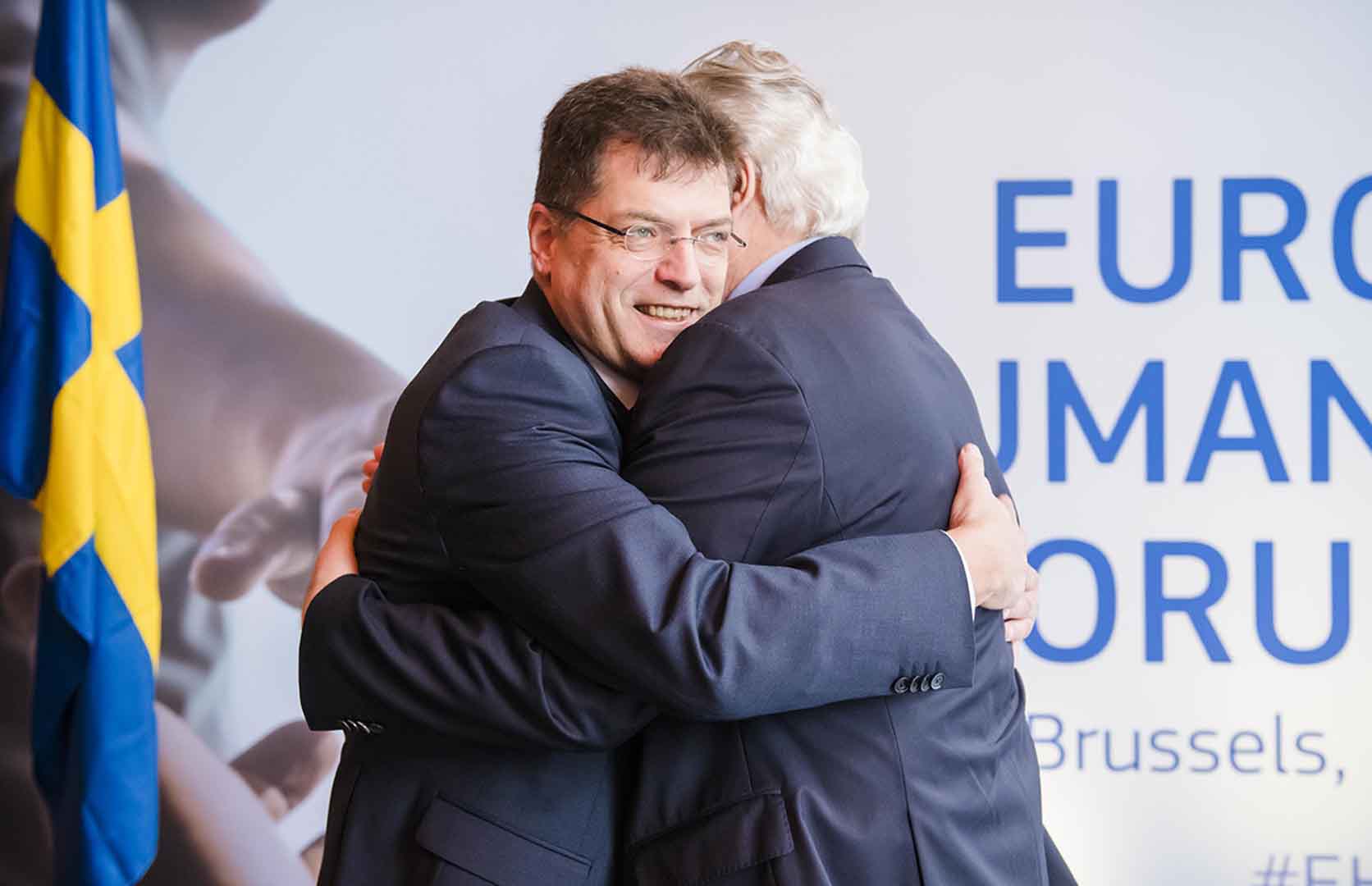Where’s the money?
An aid summit in Brussels this week circled around a familiar riddle for the cash-strapped humanitarian sector: Who has funding, who gets it, where does it go, and how does it get there.
Staged by the European Commission's humanitarian aid department, ECHO, the 20-21 March European Humanitarian Forum brought together aid workers, donors, and political players for public panels and behind-the-scenes meetings.
It was the second edition of an event whose backers appear intent on making an annual affair. Here are three takeaways:
Impartiality: Mixing politics and humanitarianism is as awkward as ever
Humanitarians tend to latch on to traditional principles like impartiality, though crises in Ukraine, Myanmar, and elsewhere continue to challenge conventions.
At the donor-led Brussels summit, however, impartiality was tossed out the window from the start as politicians took turns making short speeches and announcing aid contributions.
Austria’s foreign affairs minister, Alexander Schallenberg, set the tone early by tying European aid to political objectives.
European countries and the EU fork out billions in aid, he said, but “our partners in Africa, and Asia, and the Caribbean all too willingly pick up the narrative coming out of Beijing or Moscow, even side with these countries in the UN and elsewhere”.
“It must be sobering for us,” he continued. “We have to get better at selling what we’re doing, in making our contributions visible, and connecting our development assistance and humanitarian aid to our economic and political interests.”
Politicians may be obliged to make political speeches, but questions of principles were inherent even in humanitarian-led discussions at a forum focused heavily on Russia’s invasion of Ukraine.
“The problem with layering geopolitical objectives on humanitarian crises [is] it completely skews the humanitarian principles.”
While many humanitarians may strive for impartiality and neutrality, the donors that fund the bulk of their work are largely Western governments with clear political agendas – and those agendas are squarely tied to Ukraine, with a multitude of other crises further back in the queue.
“The problem with layering geopolitical objectives on humanitarian crises [is] it completely skews the humanitarian principles,” said Barry Andrews, a member of the European Parliament, speaking at a panel on prioritising scarce aid resources.
A separate pledging conference for the underfunded response to the earthquakes in Syria and Türkiye was meant to share the spotlight, but discussions frequently veered back to the relatively well-funded response to the crisis in Ukraine.
Local aid: You can teach an old donor new tricks
The humanitarian sector has long promised (and mostly failed) to revamp emergency aid by making it locally driven. One of several core issues: giving funding directly to local groups. But one of the world’s biggest aid donors can’t fund local groups directly – the European Union’s humanitarian funds can only go to EU-based groups and UN agencies.
ECHO used the forum to launch what one EU diplomat called “the next best thing”: new guidelines on “promoting equitable partnership with local responders”, aimed mostly at the big international NGOs and UN agencies that get the bulk of EU humanitarian funds.
On paper at least, there’s much that local groups have long demanded: language on meaningful relationships instead of subcontracting, multi-year funding, recognising local skills, and supporting local leadership.
There is cautious optimism from heads of local aid groups, but also a glaring roadblock: Separate EU regulations place a cap of 60,000 euros on what can be re-allocated.
“We are not a big organisation,” Nanette Antequisa, who leads Ecoweb, a group based in Mindanao in The Philippines, told The New Humanitarian. “But our annual budget as of now is actually around 1 million euros.”
Michael Koehler, ECHO’s deputy director-general, agreed that the limit was a “ridiculously low amount”, but suggested it and other hurdles could change in the future.
International NGOs, meanwhile, worry that they bear all the burden – and the financial risk – of making the ECHO’s local aid vision a reality: They’re expected to channel EU cash to grassroots groups, but the EU also lacks blanket humanitarian exemptions for sanctions.
“The failure to change the risk burden will continue to be an impediment on localisation,” Dominic Crowley, president of the European NGO network Voice, said on a panel meant to launch the EU’s new local aid guidelines.
Funding: Humanitarians are still looking for a silver bullet
Humanitarian needs are soaring, and donor budgets aren’t keeping pace. Who will supply the cash? Aid officials continue to look under the carpet for the answers.
Among the ideas floated at one panel: national contributions tied to GDP, scaling up help from the private sector, tapping in to development and climate financing, and leaning on so-called emerging donors.
“We have to call them out. These are countries that are having Olympics and World Championships, and putting up satellites in space at an enormous rate.”
There are dozens of governments that that should be contributing far more, said Jan Egeland, head of the Norwegian Refugee Council.
“We have to call them out,” he said. “These are countries that are having Olympics and World Championships, and putting up satellites in space at an enormous rate.”
There has long been a push for more development and climate funding to go to countries facing crises, and for the private sector to step up. But aid analysts say humanitarians shouldn’t expect deep-pocketed players like the World Bank to simply step in and fund a static system.
Similarly, there’s untapped potential in the private sector to innovate and drive economic growth, but not as a bottomless bank account for depleted aid funds, said Per Heggenes, CEO of the IKEA Foundation.
“The least effective thing you can do with the private sector is ask them for a cheque,” he said.
Edited by Andrew Gully.






